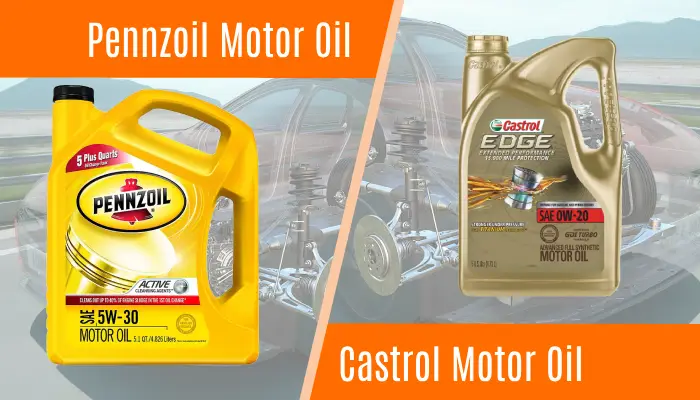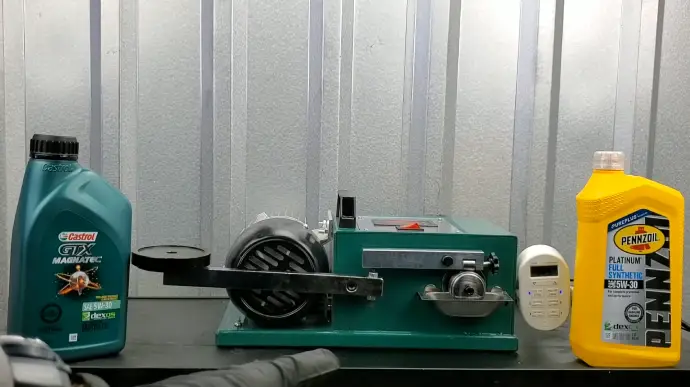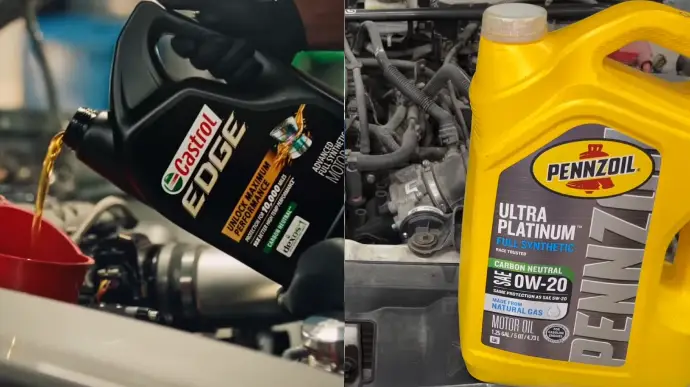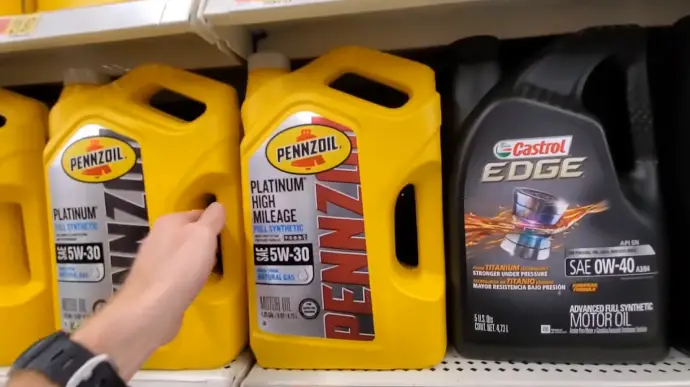Physical Address
304 North Cardinal St.
Dorchester Center, MA 02124
Physical Address
304 North Cardinal St.
Dorchester Center, MA 02124

The choice of motor oil for your vehicle is an essential choice that directly impacts engine performance, longevity, and overall maintenance. Pennzoil Platinum and Castrol Edge are two of the most prominent synthetic oils available, offering unique benefits.
Pennzoil Platinum is derived from natural gas, offering a cleaner and more consistent base oil. It contributes to its ability to resist heat, prevent carbon deposits, and improve fuel economy.
In contrast, Castrol Edge is a blend of petroleum-based lubricants and castor oil, which may offer less protection against carbon deposits.
With this blog post, we’ll discuss technical details and analyze the contrasting features of these two popular brands. So, strap yourself in and prepare for a journey to help you understand the surprising differences between Pennzoil and Castrol.
No products found.
No products found.

You need to consider several factors when comparing Pennzoil and Castrol motor oils. Most of these differences come down to the base oils used in each product. Here are a few factors that help distinguish the two brands:
Pennzoil Platinum is derived from natural gas, providing a cleaner and more consistent base oil. Natural gas is a hydrocarbon fuel composed primarily of methane, which undergoes a complex refining process to produce the base oil. This results in a higher-quality lubricant with improved performance characteristics.
On the other hand, Castrol Edge is made from castor oil and petroleum-based lubricants. Petroleum-based lubricants are derived from crude oil through refining processes, while castor oil is obtained from the castor bean plant. This unique blend of base oils gives Castrol Edge its distinct properties and performance capabilities.
The Platinum formula of Pennzoil enhances fuel efficiency and provides excellent wear protection. Its advanced additives reduce friction and improve engine performance, resulting in better fuel economy. This makes it an ideal choice for drivers who prioritize fuel consumption and want to maximize their mileage.
Conversely, Castrol Edge is engineered to focus primarily on wear protection. Its unique blend of additives forms a protective layer on engine components, reducing friction and minimizing wear and tear. Those who prioritize engine longevity and want their cars to perform their best will like Castrol Edge.
Pennzoil Platinum incorporates Zinc Dialkyl Dithiophosphate (ZDDP) in its additives, providing robust engine protection and wear resistance.
ZDDP forms a protective layer on metal surfaces, reducing friction and preventing metal-to-metal contact. This additive technology is especially beneficial for high-performance engines, as it helps to maintain engine performance even under extreme conditions.
Meanwhile, Castrol Edge utilizes Titanium Oxide nanoparticles in its additive technology. These nanoparticles form a strong and durable barrier on engine surfaces, preventing the formation of deposits and reducing wear.
This technology provides advanced protection against engine deposit formation and ensures long-lasting engine performance.
Pennzoil Platinum offers a wider range of viscosity options, including 0W-16, 0W-20, 5W-20, 5W-30, and 10W-30. These options cater to a broader spectrum of vehicle and climate needs.
The 0W-16 and 0W-20 options are ideal for colder climates, providing excellent cold-start protection. Many vehicles use 5W-20 and 5W-30, which are suitable for various temperatures. The 10W-30 option is better suited for warmer climates and offers enhanced protection against wear and deposits.
On the other hand, Castrol Edge offers similar viscosity options but also provides a 10W-40 blend, which can benefit specific vehicle requirements. With this range, drivers can choose the viscosity rating that best fits their climate and vehicle type.
The Platinum formula of Pennzoil protects your engine from heat and carbon buildup, keeping it clean and free of deposits. It protects against power loss and deposit formation, making it an excellent choice for maintaining engine cleanliness.
As opposed to this, Castrol Edge focuses on preventing engine deposit formation, potentially relying more on detergents. This different approach may offer alternative benefits in terms of maintaining engine cleanliness.
Both Pennzoil Platinum and Castrol Edge offer different formulations that cater to specific engine types.
With Pennzoil Platinum, performance vehicles are well-protected and lubricated under high-stress conditions. It’s engineered to withstand extreme temperatures and maintain its viscosity, ensuring consistent performance.
Conversely, Castrol Edge is often recommended for high-mileage engines. It contains additives that help reduce wear and protect against deposits, making it suitable for older engines that may have accumulated more miles.

Pennzoil Platinum base version is recommended for a shorter oil change interval of up to 8,000 miles. This makes it suitable for SUVs and passenger cars, especially in harsh driving conditions.
On the other hand, the Castrol Edge base version offers a longer oil change interval of up to 10,000 miles. This makes it an excellent choice for high-performance vehicles and race cars, where frequent oil changes may be impractical.
It’s important to note that these intervals are based on each brand’s specific formulations and engine compatibility. For optimal performance and longevity, it is important to follow the manufacturer’s recommendations.
Even in harsh winter conditions, Pennzoil Platinum ensures strong engine starts due to its improved flow at cold temperatures. This is due to the formulation that allows it to flow more easily, reducing the risk of engine damage during cold starts.
On the other hand, Castrol Edge’s cold temperature performance mightn’t be as effective as Pennzoil Platinum. Castrol Edge uses a different base oil blend, which may not provide the same flow level and protection in extremely cold conditions.
Therefore, if you live in an area with harsh winters, choosing Pennzoil Platinum could benefit your vehicle’s cold-temperature performance.
Pennzoil Platinum motor oil is formulated to meet API SP/GF-6 and Dexos 2 standards, ensuring that it meets the requirements set by the American Petroleum Institute and General Motors.
This means that Pennzoil Platinum has undergone rigorous testing and meets the performance and quality criteria set by these industry standards.
Meanwhile, Castrol Edge also meets these standards but focuses on reducing engine deposit formation to maximize engine response and performance.
The affordability of Pennzoil Platinum makes it a popular choice among budget-conscious consumers. It offers a cost-effective option without compromising on quality.
In contrast, Castrol Edge is slightly more expensive, reflecting its premium status in the synthetic oil market. The higher price tag of Castrol Edge can be attributed to its advanced technology and superior performance.
You should consider using Pennzoil for your car because it’s a high-quality motor oil that helps improve engine efficiency and performance. Pennzoil synthetic motor oil is formulated to keep pistons cleaner than other oils. It allows your vehicle to run at peak performance in various weather conditions and terrains.
With its advanced formulation and proven track record, Pennzoil is a reliable choice for maintaining the health and longevity of your car’s engine.
If you own a BMW, you should know that Pennzoil comes highly recommended by the manufacturer. BMW specifically recommends using Pennzoil Full Synthetics for its cars. This recommendation is based on Pennzoil’s expertise in motor oil.
Pennzoil Full Synthetics are formulated to meet the specific requirements of BMW engines, providing exceptional protection and performance. These oils are designed to withstand high temperatures and provide excellent lubrication, reducing friction and wear on engine components.
Castrol’s 5w30 full synthetic motor oil is designed to provide optimal performance and protection for vehicles with over 75,000 miles. This specific viscosity grade ensures excellent lubrication at low and high temperatures, reducing engine wear and improving fuel efficiency.
With Castrol EDGE High Mileage 5W-30, advanced Fluid TITANIUM Technology increases the oil’s resistance to metal-to-metal contact and strengthens the oil’s film strength. This helps to minimize engine wear, maintain engine cleanliness, and prolong the life of your vehicle’s engine.

Due to unpredictable additives, mixing Pennzoil Platinum and Castrol Edge motor oils in your vehicle is not recommended.
Each motor oil brand has its unique formulation and additive package, specifically designed to work optimally with the engine components. Incompatible additives can result from mixing brands, resulting in decreased performance and potentially damaging effects on engines.
The two oils may also not blend well due to their different viscosities and properties, leading to reduced lubrication and increased engine wear.
To ensure maximum engine protection and performance, it’s best to stick with one consistent brand and type of motor oil recommended for your vehicle.
After comparing Pennzoil and Castrol motor oils for vehicles, it’s clear that both brands have their advantages and recommendations. These two brands offer a range of characteristics, from base oil composition to protection capabilities, that cater to diverse preferences and applications.
Whether you prioritize fuel economy, engine cleanliness, or high-temperature stability, Pennzoil Platinum and Castrol Edge offer exceptional performance. To make the right selection, you should consult your owner’s manual and consider the vehicle type, driving environment, and desired oil change intervals. By doing so, you can ensure that your engine receives the optimal protection and performance it deserves.
Last update on 2026-02-18 / Affiliate links / Images from Amazon Product Advertising API